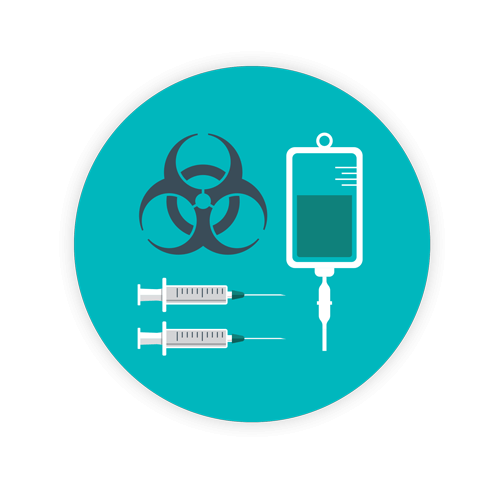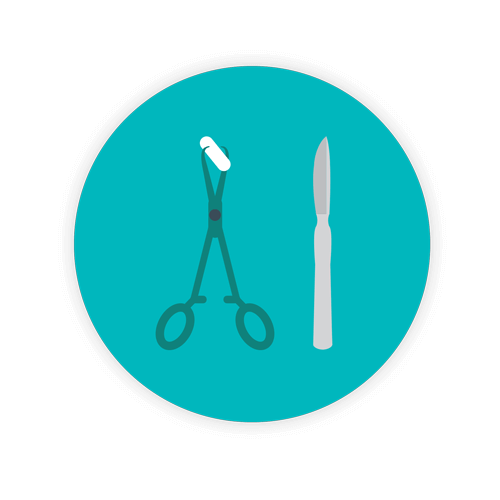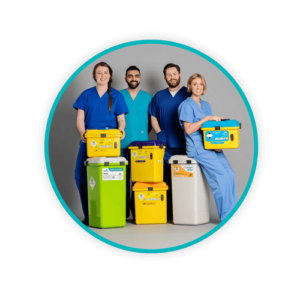Why Hospital Waste Management Is Important

Editor’s note: This post was originally published in November 2020 and has been completely revamped and updated for accuracy and comprehensiveness.
Ever wondered why you should be concerned about hospital waste management? If you don’t work in a hospital, that would be strange… but if you do, please read on.
Waste management is a crucial aspect of healthcare delivery within the NHS, impacting everyone working in a hospital setting and the five core areas of need: safety, sustainability, efficiency, compliance, and education.
Let’s dig a little deeper into why it’s so important.
TOPICS WE WILL COVER:
1 / Do You Need Help Managing Hospital Waste?
2 / Understanding Hospital Waste
3 / Why Is Hospital Waste Management Important?
4 / How Hospital Waste Management Impacts the Five Areas of Need
5 / How Is Hospital Waste Managed?
6 / What Happens to Hospital Waste
7 / Hospital Waste Management Tips
9 / Hospital Waste Management Tailored to Your Needs
Do You Need Help Managing Hospital Waste?
Sharpsmart offers tailored solutions for all types of healthcare waste, whether you need an expert clinical waste disposal service, a fully managed sharps disposal service, or help with offensive waste, we can help.
Our Four Walls approach to hospital waste management is much more than providing bins and collection, it means you’re fully supported as our experts work alongside clinical staff to drive outcomes that align with the NHS Clinical Waste Strategy.
Understanding Hospital Waste
Hospital waste is more nuanced than other business or household waste types. It covers a wide range of complex waste materials generated during patient care, from offensive waste and medicinally contaminated sharps to infectious clinical waste and pharmaceutical residues. Proper management is crucial for protecting patients, staff, and the environment.
Understanding hospital waste and how to identify, classify and manage it according to the waste stream is essential knowledge for healthcare workers. Misclassification can have terrible consequences, such as:
- Increased costs: Overclassification leads to higher disposal costs as more stringent treatment methods are used.
- Environmental impact: Waste overtreatment employs carbon-intensive methods that lead to an increased carbon footprint.
- Public health: Infectious wastes pose a significant risk of disease transmission if managed improperly.
Getting hospital waste management right often involves far more than knowing what healthcare waste is. It’s also imperative to keep staff up to date with training and choose the right waste partner.
The potential impact and consequences of mismanaged hospital waste help us to understand why it’s so important we get it right the first time, every time.
Why Is Hospital Waste Management Important?

The importance of hospital waste management cannot be overstated, and with various types of healthcare waste generated by every department in a hospital, all healthcare workers need awareness of compliance and best practices.
Effective hospital waste management is paramount for:
- Public health: Preventing the spread of infectious diseases both within the hospital environment and the wider community.
- Environmental protection: Minimising the environmental impact of waste disposal and the pollution of soil, water and air.
- Occupational safety: Protecting healthcare workers from exposure to hazards such as needlestick injuries and bloodborne pathogens.
- Legal compliance: Adhering to strict environmental and health and safety regulations, such as those in the Health Technical Memorandum (HTM) 07-01.
- Cost-effectiveness: Optimising waste management practices to reduce costs and improve resource efficiency.
- Sustainability: Aligning with the NHS Clinical Waste Strategy and route to Net Zero, promoting environmentally responsible practices.
When done correctly, hospital waste management should positively impact the five core areas of need within healthcare…
How Hospital Waste Management Impacts the Five Areas of Need
Regardless of your job title, if you work within healthcare, your actions impact the five core areas of need. Each healthcare worker in every hospital has a vital role to play. Here are some ways that effective waste management directly contributes to each area of need:
Safety: Protecting Healthcare Workers and Minimising Risks
Safety is a huge part of hospital waste management and should be a top priority at every stage of the waste journey from production onwards. Introducing safety-engineered devices and following waste management best practices will help reduce the risk of needlestick injuries and blood and bodily fluid exposure.
The less a healthcare worker has to handle waste (infectious or not), the better. By minimising waste handling, you reduce the opportunities for cross-contamination and, as a result, the number of incidences of hospital-acquired infections (HAIs).
Effective hospital waste management contributes to public health and community well-being not only by keeping healthcare workers safe but also by protecting patients, visitors, and others handling waste down the line.
Sustainability: The Environmental Impact of Healthcare Waste

With the route to Net Zero well underway, sustainability is a hot topic. This isn’t limited to the NHS either. Private healthcare is also working to become more environmentally responsible.
The increased focus on the offensive waste stream – now mandatory as part of the NHS Clinical Waste Strategy – highlights a shift in healthcare waste towards more sustainable treatment options. However, this waste stream depends on correct segregation and compliant disposal to be successful.
It’s also important to consider other sustainable waste initiatives such as waste reduction, reuse and recycling – doing your best to continually move your waste up the waste hierarchy in the most efficient way possible.
Efficiency: Allocating Hospital Resources to Reduce Costs
Although efficiency covers a broad spectrum, let’s begin by discussing money. Every year, hospitals spend untold amounts of money sending overclassified and incorrectly segregated waste for disposal via high-temperature incineration – an inflated cost which can be easily avoided.
Effective hospital waste management allocates your resources efficiently to ensure you’re getting the most out of your budget and staff labour. Your waste management processes should be optimised from the point of production onwards to continually drive efficiencies. This includes having the right bins in the right places, depending on the types and volumes of waste being produced in any given area.
Compliance: Understanding and Adhering to Regulatory Standards
Sticking with our running theme, incorrect waste segregation is one of the leading non-conformances that hospitals are up against when it comes to maintaining compliance.

A non-conformance we see a lot is infectious and offensive waste sacks being mixed when deposited into the larger bins in the waste hold. Staff can follow the best segregation practices in the wards and departments, but if infectious and non-infectious waste meet in the waste hold, it’s all been for nothing.
Waste segregation is just one cog in the rather large and ever-turning compliance wheel. There are plenty more, such as properly labelling containers and filling out the necessary documentation and consignment notes for waste leaving the hospital.
Ultimately, it’s a waste generator’s responsibility to properly segregate and document waste, but any waste management service provider worth their salt will help your organisation to succeed. Dishing out fines without education and training isn’t a solution.
Education: Tools and Resources to Correctly Manage Waste In Hospitals
The leading cause of waste problems is insufficient staff training. A lack of proper training and awareness among staff members regarding waste management procedures will lead to problems.
At Sharpsmart, we’ve always taken a partnership approach to healthcare waste management, providing consultancy and guidance within the four walls of the organisations we’re working with.
As well as providing on-hand training for staff and delivering education through our signature blended learning system, we also create and provide educational material in the form of blog articles and posters.
How Is Hospital Waste Managed?
Imagine getting to this part of the blog and still wondering how hospital waste is managed. We’ve got you covered! Hospital waste management involves a multi-step process, and the most effective place for this process to begin is at the point of generation.
Waste Segregation
Proper segregation at the source is crucial. There are many types of waste bins in hospitals, and you should always follow the appropriate hospital waste colour coding to ensure the waste is treated according to its type.
It’s important to ensure segregation best practices are also adhered to once waste is taken to the waste hold for storage.
Waste Collection
Regular and efficient waste collection requires a waste provider who understands your waste volumes to deliver an optimised service that doesn’t involve too many or too few collections.
Overflowing bins are one problem if you don’t have enough collections, but have too many and you could end up paying twice as much for half-empty bins to be collected. The higher bill also comes with a higher carbon footprint.
Waste Transportation
The safe and secure transportation of your waste from your hospital to a licensed treatment and disposal facility. This process must be tracked and monitored so you have oversight of where your waste is going and how it’s treated.
Waste Treatment
There are many treatment options for the various types of hospital waste, some may include autoclaving, incineration, chemical treatment, etc. We’ll take a slightly more in-depth look at what happens to hospital waste shortly.
Waste Documents
Maintaining accurate records of waste generation, disposal, transport, and treatment is a requirement for compliance and auditing purposes.
What Happens to Hospital Waste
The fate of hospital waste depends on its type and the chosen treatment method. It’s also worth noting that some waste service providers have access to different technologies.
Some of the treatment options available for the different types of healthcare waste include:
- High-Temperature Incineration
- Alternative Treatment
- Effluent Retention (for medicinally contaminated sharps)
- Solid Recovered Fuel (SRF)
- Refuse Derived Fuel (RDF)
- Energy from Waste
- On-Site Shredding
- Recycling/Repurposing
Hospital Waste Management Tips
- Promote awareness and educate staff about the importance of proper waste segregation and handling.
- Implement clear and consistent waste segregation guidelines and practices.
- Explore opportunities to reduce waste generation through source reduction and reuse initiatives.
- Collaborate with suppliers to minimised packaging and opt for environmentally friendly products.
- Use modern waste management technologies to keep track or your waste with accurate data.
- Conduct regular audits to assess compliance and identify areas for improvement.
- Encourage open communication amongst staff and report any non-compliance issues.
Key Takeaways 
- Effective hospital waste management is a crucial part of healthcare provision, affecting public health, environmental protection, occupational safety, legal compliance, cost-effectiveness and sustainability.
- Proper waste segregation, handling and disposal are essential for minimising risks, reducing environmental impact, and ensuring efficient resource allocation.
- All healthcare workers play a critical role in proper waste management by following best practices and staying up to date with regulations.
- Ongoing education and training are vital to ensure staff are aware of their responsibilities and can manage hospital waste effectively.
- By implementing a robust waste management system, hospitals can contribute to a safer, healthier, and more sustainable healthcare environment.
Hospital Waste Management Tailored to Your Needs
Proper management of healthcare waste within hospitals is a responsibility that falls upon every healthcare worker and by embracing the principles of safety, sustainability, efficiency, compliance, and education, hospitals can foster a culture of responsible waste management.
At Sharpsmart, we work inside the four walls of your facility alongside clinical staff to drive better healthcare waste management tailored to your specific needs and optimised to achieve the best results.
Contact us today to learn more about our clinical waste services and how we can help you create a safer and more compliant waste management system for your facility.
Let's Talk!
Your time is valuable, and we don’t want to play hard to get. You can either phone us directly on the details listed on our contact page, or feel free to fill out this short form and one of our team members will get back to you as quickly as possible.

